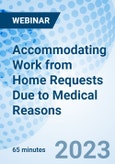Understand the factors to consider when evaluating requests and best practices for documenting and communicating the ultimate decision to employees.
Many employers have been faced with an influx of requests to work remotely as a reasonable accommodation under the ADA, particularly following the COVID-19 pandemic. They may not understand how to evaluate a request to work remotely under the ADA framework, or, be unaware of the secondary employment issues that granting a remote work request may trigger, such as monitoring employee performance, complying with wage and hour laws, protecting proprietary information and trade secrets, and expense reimbursement obligations.
Learning Objectives
- You will be able to define the EEOC’s stance regarding remote work as a reasonable accommodation under the ADA.
- You will be able to explain how to handle the ADA interactive process with respect to remote work accommodation.
- You will be able to identify best practices for administering remote work accommodations and denying requests for the same.
- You will be able to recognize secondary employment issues raised by providing remote work accommodations, such as FLSA implications and expense reimbursement requirements.
Agenda
Overview of Remote Work as a Reasonable Accommodation
- Historical Approach to Reasonable Accommodations
- COVID-19 Changes View on Remote Work
- EEOC Stance on Remote Work Accommodations Post COVID-19
How to Handle Remote Work Accommodation Requests.
- Best Practices for Engaging in Interactive Process With Prospective Remote Workers
- Communication and Documentation Considerations
- Lessons Learned From EEOC
- What to Do If Remote Work Is Granted
Policy Considerations and Implications of Remote Work Generally
- Pros and Cons to Remote Work
- Remote Work Can Impact Many Other Employment Issues
FLSA Issues to Consider
- FLSA Refresher
- Best Practices for FLSA Compliance
- Hypothetical or Case Study
Reimbursement Issues to Consider
- Do Employers Need to Reimburse Remote Work-Related Expenses Under the ADA?
- What About Under State Law?
- Hypothetical or Case Study
Speakers

Jacqueline A. Hayduk,
Foley & Lardner LLP- Labor and Employment Attorney at Foley & Lardner LLP
- Helps employers across the country achieve their business goals while minimizing legal risk with respect to various employment actions, including by advising clients on compliance with state and federal anti-discrimination laws, such as Title VII and the ADA, leave laws, and wage and hour laws. She also has substantial experience litigating trade-secret misappropriation and breach of restrictive covenant claims.
- Represents clients in a wide range of litigation matters before federal and state courts and administrative agencies. She also counsels clients on employment issues, from appropriate accommodations to correct classification of employees, and has conducted numerous internal investigations related to sexual harassment allegations and theft of intellectual property, providing her clients with valuable risk analysis and recommendations for forward-looking remedial measures.
- Authored numerous publications regarding the above topics which, including a recent article regarding Remote Work Considerations In A Post-Pandemic World.
- Pratice’s in Michigan and the Eastern District of Michigan.
- Obtained JD from Northwestern University School of Law in 2016, and B.A. from Michigan State University in 2012.
Who Should Attend
This live webinar is designed for human resource managers, benefits and payroll administrators, personnel managers, business owners and managers, and attonreys.









